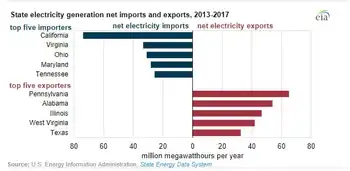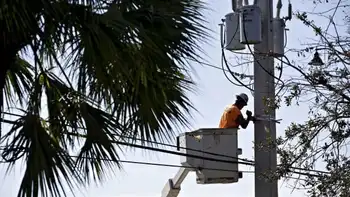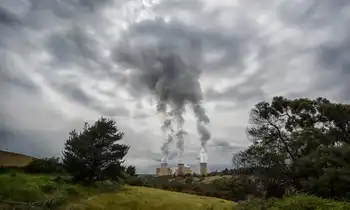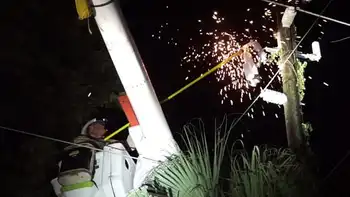Critics say TVA bid process was flawed
By The Tennessean
NFPA 70e Training
Our customized live online or in‑person group training can be delivered to your staff at your location.

- Live Online
- 6 hours Instructor-led
- Group Training Available
Based on that study, TVA decided to complete the reactor — and then contracted with Bechtel to do the job.
Critics say Bechtel had a clear conflict of interest in doing the study and casting the project in a favorable light, knowing that it would be able to bid on the multibillion-dollar construction work to finish Watts Bar Unit 2.
The question arises as TVA has renewed its pursuit to own more nuclear units, raising the ire of environmentalists and others who say the agency is setting itself up to waste ratepayers' money.
The study itself has not been made public.
TVA's directors would not comment, and the agency's chief ethics officer declined to talk about the accusations of conflict of interest.
However, TVA spokesman Gil Francis said, "The fact that we awarded the contract to Bechtel is not a conflict of interest. We did a competitive bidding process that looked at the best engineering firms that are out there. We made sure all had the same information."
Five companies, including Bechtel, were asked to submit bids. Two — Bechtel and Stone & Webster — responded. Bechtel was chosen six months ago as the major contractor for up to $1.1 billion of work to finish what's estimated as a $2.5 billion project.
"You don't have as many companies out there with expertise anymore," Francis said. "If you exclude Bechtel, you're excluding the best company for the work."
TVA Inspector General Richard Moore said he understood how someone might see the appearance of a conflict of interest but he didn't think there was one.
"If TVA had excluded Bechtel, it would have essentially resulted in a sole-source contract," Moore said. "It is our understanding that both bidders were provided the same information on which to bid."
The Tennessean asked that the entire study be made public under the federal Freedom of Information Act. TVA said that it was still considering that request.
Francis said the information in the study Bechtel conducted — also on a contractual basis — could not be released because it is largely proprietary and could shed light on business practices of contractors. He provided the newspaper with a 12-page summary of it.
Stephen Smith, a longtime TVA watchdog, said the authority's ratepayers are losing. "Nobody's asking the tough questions about Watts Bar 2," said Smith, who is with the Southern Alliance for Clean Energy in Knoxville.
Private utilities in many states have to go before state utility commissions, he said, and justify the need for building a new power plant, and the public can challenge them.
"They let Bechtel build its own case and then enrich itself by basically doing the work," Smith said. "We've pretty much hitched our wagon to the nuclear industry that left TVA with a $20 billion debt before."
TVA once had projects under way to build 17 new nuclear reactors but scuttled most when they proved too costly and unneeded — as protesters had argued when the units were approved.
The agency was left with deep debt and rising rates. One of those units is Watts Bar 2, mothballed in 1985 after being more than half completed. About $1.7 billion has been spent on it, officials say.
The romance with nuclear power waned countrywide, and so did the number of possible contractors. Today, the industry is getting a boost from a bevy of federal incentives to build nuclear plants, including tax credits, loan guarantees and risk protections that Congress approved in 2005.
A Bechtel official had little to say about the conflict accusations:
"This was a fair, competitive bid process, and we are honored to be selected by TVA for this historic assignment," Bechtel spokesman Francis Canavan said.
But Michael Mariotte, executive director of the Nuclear Information and Resource Service, a nonprofit advocacy group in Maryland, said it would be far better to separate the study and building phases.
"You do think you would try to find some company that has the nuclear expertise that would not be involved in the construction," he said.
TVA, the nation's largest public power provider, is self-financing and is an economic pillar of the state, offering reasonable rates when compared nationally.
The agency creates the electricity sold via distributors, including Nashville Electric Service, throughout virtually all of Tennessee and parts of six adjacent states.
Nuclear power is favored as an energy source in some quarters because it doesn't have smokestacks that emit pollutants that add to climate change.
Over the last 14 years, demand for TVA's electricity has grown 2.4 percent, and the only answer is a coal or nuclear plant, Francis said.
When the costs were compared, nuclear won out "because it was the safest, least costly, environmentally friendly option," he said.
"We knew Bechtel would probably want to bid on the project," Francis said.
TVA has specialized staff that analyzed the Bechtel information and stayed closely involved in the process, he said.
The Tennessean sought to contact all seven sitting members of the nine-seat TVA board of directors, calling or e-mailing each of them. Only one replied.
The messages left with the other six board members yielded only a return call from Francis, who said the board members declined to be interviewed.
Director Skila Harris was the only one who took the newspaper's questions.
She said the board looked at the contracts in both cases with care to make sure ratepayers would get the best deal and Bechtel wouldn't have an edge.
"It's not as if those people who bid on that did not have an incentive to put together the best package at the lowest feasible price, given the scope of the work," said Harris, a native of Bowling Green, Ky.
Mariotte said TVA might have a point about the number of companies available to bid. And he said a consultant might come up with the same information "but then you don't have the apparent appearance of a conflict," he said.
"We're seeing with TVA that they really haven't done that initial work of what's the best way to get electricity to consumers. The cost estimates we're seeing for new nuclear plants now are rising stratospherically."
TVA's inspector general said he didn't have a problem with what the agency had done.
Moore quoted federal acquisition regulations on conflict of interest, saying a level playing field is needed among bidders on a project.
The U.S. Department of Energy has taken a somewhat different tack as it pushes to build at Nevada's Yucca Mountain, where the department proposes that nuclear plants send their highly radioactive waste for disposal. It announced this month that whatever company does the scoping, preparation and design work will not be allowed to bid on building it.
Bechtel holds the current operations and management contract for the facility, which the Energy Department says it will rebid.
Moore said he didn't know whether the Yucca Mountain and TVA situations were comparable.











